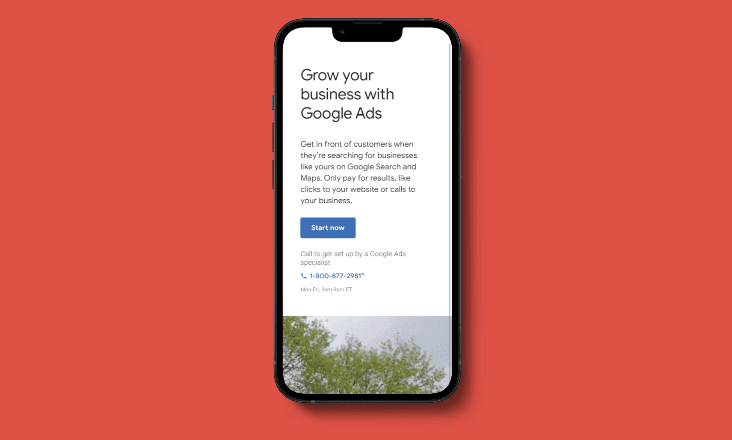OEPMA has been running Google Ads for clients for nearly a decade now. In that time, we have observed a thing or two. You know what that means, we’re going to create a list where we can throw a number in the headline where people will be more inclined to click to read this content.
Before we get into this… This list isn’t meant to be some big data or settings fest where we’re showing graphs, charts, and screenshots on how to tune in your campaigns. It’s just raw, straight off the top-of-the-head observations. We have more that we’ll get to later, but these seven were fresh in our minds at the time of writing.
We’re writing this because of all of our services, Google Ads seems to be most misunderstood and, as no surprise, the one that causes businesses the most stress when they’re trying to do it themselves or even working with an agency.
So let’s get into it:
1. No One Knows Anything Until You Spend The Money
It’s all one big guess until the credit card on your account starts racking up charges and building data. Anyone who tells you they know how well your account or campaigns will perform is not being truthful or running campaigns in the same industry in the same geography that you’re planning on running.
Sure one can have a good idea of what may happen based on prior results, but knowing for sure and telling a client you know is a fool’s game. There are so many factors at play. Campaigns that are carbon copies of each other run in two different neighboring states can have wildly different outcomes.
2. You Need to be Dedicated for 3-6 Months
Let’s say you’re a business and want to try Google Ads. So you either set it up all yourself or hire an agency to do it for you. In either situation, you need to decide how much you want to spend and run it for 3-6 months.
Let’s say you have $10,000 you want to invest in this little venture. Instead of going hog wild for one month, thin it out a bit and spend $3,333 a month.
Why? Because this allows data to build in the account. You or your agency can go in with a scalpel and fine-tune the campaigns’ settings, keywords, ads, and so on.
If you went and blasted your whole $10,000 in a 30-day interval, yeah, you’d have some data for sure, but it’s just too little of a window of time to interpret what’s happening and make small changes that will improve the campaign.
A popular saying about investing money in Google Ads (or any PPC platform) compared to Search Engine Optimization is that Google Ads is instant.
Well, Yes and No. Yes, you could go work up a Google Ad Campaign this morning and show up at the top of Google SERP by noon, but you might also be showing up for a bunch of irrelevant trash you don’t want, which exhausts your account’s budget if people click. Not Good!
You can get up there quickly and even get instant results, but it takes time to fine-tune the account where it’s humming and not wasting money on irrelevant searches.
3. There Is No “Right Way” These Days | Many Ways to Win
Years back, we probably would have never said this because the way to manage campaigns successfully at one time was pretty cut and dried.
Google Ads has been evolving a lot in recent years. The bidding options have gone from just a simple manual bid on a particular keyword to show up to now a slew of Automated and Smart Bidding strategies.
Ads have evolved as well. From Text Ads, where you specifically put what you wanted to show up on the SERP (Search Engine Results Page) to Responsive Search Ads where you feed Google many different headlines that their AI tests for the best one and, depending on your settings, will serve that one more often.
Additionally, you can do Call-Only Ads, Dynamic Ads, and so on.
For a business owner just wanting to get leads and make money, this specific jargon may not matter. We get it. You want leads that turn into customers and clients. The way the sausage is being made doesn’t matter as long as it’s within ethical guidelines.
We mention this here because we’ve had businesses call us to look at their account because they are unhappy with their current agency or person running the account. They don’t think it’s doing well or operating to its full potential. We’ve done this for many people.
Here’s the absolute stone-cold truth about many of these; we could easily have scared the business owner to death about what we viewed in the account because it was maybe a little different from how we would run it.
The thing is this, in about 80% of these calls, the campaign was doing pretty good. Yeah, we might have changed a thing or two here or there, and we’d let them know that, but it wasn’t as out of whack as the other 20% we’ve seen. Not even close.
With so many options available to win, it’s easy for business owners who don’t have a firm grasp on those options to get confused. It’s also pretty easy to confuse them.
4. Your Ads Are Going to Get Copied
This is a recent one, and we blame the Responsive Search Ad algorithm.
As mentioned above, Responsive Search Ads allow advertisers to come up with many headlines, and the Google AI tests the best combos and displays what they think will convert depending on the searcher’s intent.
If you have many competitors in your space, some are just going to search and see what you’re doing and throw it on their list to fill it out.
Maybe you, reader, have done this with your Responsive Search Ads. It’s cool. There’s no law against it.
While you may have a Responsive Search Ad combo that is working well, maybe create another one in the Ad Group where you’re constantly working on new wording and appeals that stand out. If you have the budget, see how it performs and make some changes down the line once you find winners.
Is it necessary? If you have a solid combo that’s getting clicks and converting, probably not. We’re just spitballing on this one.
5. Disruption Usually Means Someone New Is In The Space
You have a great campaign. It’s beautiful. You have a steady monthly budget, and you can almost set your watch to how many conversions you’re going to get a month.
Then one month, your volume is down. Your conversions are down. You didn’t touch the campaign because it was running so smoothly.
What’s going on?
Not 100% of the time, because nothing is absolute in this world, but a majority of the time, we find when this happens, it means a new competitor has entered the space at a significant budget.
What do you do?
Generally, our view on this is to wait them out. We’ve seen many competitors come and go quickly in our managed campaigns. Many of them haven’t read observation three (You Need To Be Dedicated for 3-6 Months) and give up quickly.
What if they hang around for longer than a month?
Then it’s time to battle. The specific battle plan would be based on many variables, including overall spend, bidding, search volume and so much more.
We can’t give you a specific plan here, but it might be time to get an agency involved to fight your battles for you if you’ve been doing this yourself and hit this wall.
5. Make Sure Everyone Is In The Know
If the person or agency who maintains your website and runs your Google Ads campaigns are different entities, you must keep the Google Ads team in the know about everything.
Seems like common sense, right? You’d be surprised.
Website updated? Let them know.
Are you adding something to the header that will display sitewide? Let them know.
Is the phone number changed on a page or all pages? Let them know.
Is your SEO team rearranging URLs for better site structure? Let them know.
It might not matter in the end, but the landing page is your golden goose. If anything is going on with it or that could affect it in any fashion, you have to let the people running your Google Ads know.
Additionally, if your Google Ads Campaigns have Sitelinks, which they should, it’s a landing page and a plethora of additional pages.
If you have Events or Conversion data set up in Google Analytics or Google Tag Manager, your Conversions in Google Ads may be intertwined. Any work in that area may put a hole in your data until someone discovers it if they aren’t alerted beforehand.
If you’re looking to hire someone to manage your Google Ads account, they should tell you what they need, but being proactive about it makes sure everyone is on the same page. So, just let your Google Ads agency know everything going on if they don’t also control your website.
6. Search Terms Report is Your Friend for Two Reasons
The Search Terms reports within your search campaign data will save and make you money.
It will save you money because you can discover nasty searches that don’t stand a chance at converting and potentially cost you money.
Here’s a quick example for you Criminal Lawyers out there. Do you handle DUIs or DWIs cases? Is one of your keywords phrase matched as “dui lawyer” or “dwi lawyer”?
Take a look at your Search Terms report. How many times has your ad appeared when some young aspiring lawyer asked, “how much does a dui lawyer make?” Not good! Unless you’re looking for an associate to join your team.
Staying on top of your Search Terms report allows you to find those nasty searches that you don’t need to show up on and take care of through Negative Keywords within the campaign.
There are other ways you could clean that up by doing exact match keywords, but we’re just making an example above.
Now, on to the making of money. The Search Terms report can show you an opportunity for content that will convert.
To do this, you’d have to run a pretty general campaign. Let’s stay with the Criminal Lawyer who handles DUIs and DWIs. Run a small budgeted campaign that only has those two terms in it. Yes, “DUI” and “DWI.”
Let that campaign run for a month. Don’t expect much from it in the way of conversions or getting business, but that’s not the ultimate goal here.
Check the Search Terms of that report each day and see all the gems you find. You will see all kinds of questions people ask about the subject where you know the answers.
Take the questions you feel are from someone who may need your services and post a page on your website answering the question. Make a video answering the question. Post on social media answering the question.
Chances are, if one person had the question, many will ask in the future.
In the future, you’ll be there organically and can focus your budget on converting those looking for a lawyer to call right this second.
Many people might shy away from that because it’s aimed more at awareness and information than someone paying you tomorrow for your services.
Look at it through the lens of market research more than converting. Market research is not free.
7. Make Your Landing Page Relevant
Again, this observation comes from looking at Google Accounts when prospective clients ask us to. They may be doing it themselves or have an agency. Sadly, we still see some people with agencies managing their accounts making this mistake.
The mistake is having precise keywords and then sending the searcher to a website where they have to work to obtain the information.
Once again, let’s go back to the lawyer example.
Let’s say this law firm handles criminal law matters. However, they want to boost their intake and leads of clients who have been charged with a DWI / DUI.
What you want to do in this situation is send them directly to a page that provides them with relevant information as to DWI and DUI legal matters. They click, and BOOM, they’re right on a page reading DWI / DUI FAQ’s, learning the process of hiring a DUI / DWI lawyer, watching videos about DWI / DUI charges. You get the picture.
You DO NOT want to send them to the front page of a general criminal law website, where they have to search through everything to find that relevant DUI / DWI page.
Sadly, we still see this a lot.
These are just seven of our many observations on managing Google Ads Campaigns. We’ll post more in the future.
If you have questions about your Google Ads campaigns, contact us. We’d be happy to help.





